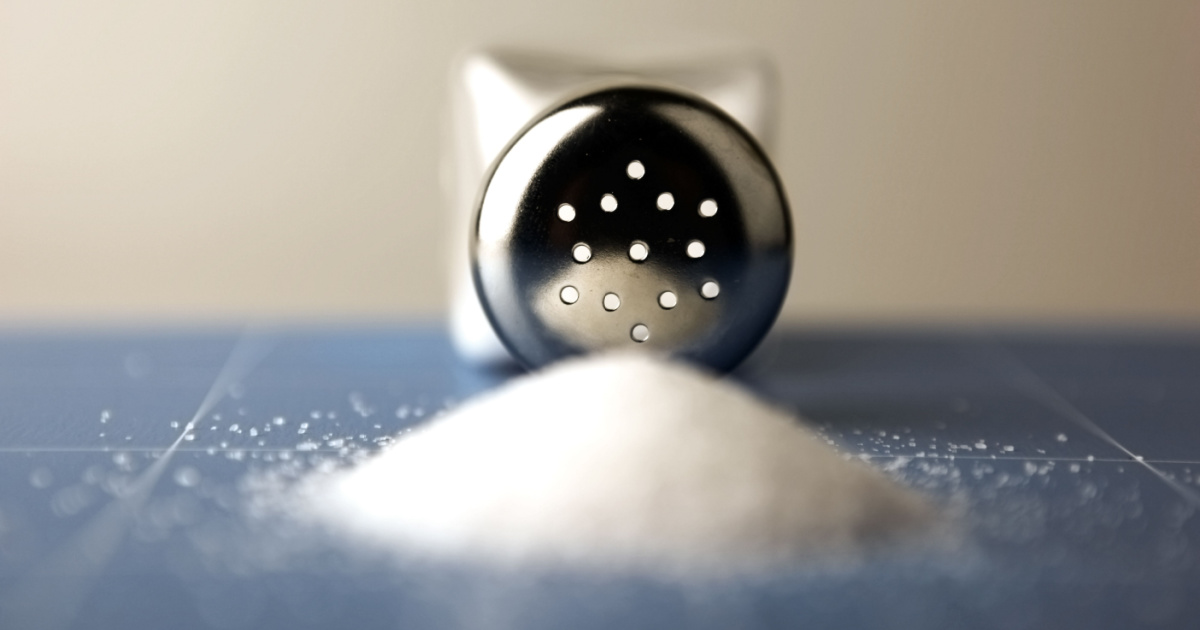Salt gets a bad rap because many people are warned against consuming too much of it. However, cutting out sodium entirely isn’t a good option either. This mineral is crucial for bodily functions like regulating blood pressure, preventing muscle pain, maintaining the nervous system, aiding the metabolism, and maintaining hydration. According to Melissa Prest, D.C.N., R.D.N., national media spokesperson for the Academy of Nutrition and Dietetics, people need at least 500 mg of sodium per day for these functions to work. But what if you’re frequently craving salt?
Possible Reasons For Craving Salt

The Centers for Disease Control and Prevention (CDC) recommends people eat 1,500 mg of sodium a day and no more than 2,300 mg. Unfortunately, most Americans eat around 3,400 mg a day. Too much sodium can lead to health consequences like impaired cognition, calcium loss, water retention, hardened blood vessels, and a higher risk for heart disease. However, it can be difficult to cut back on salt when you’re craving it often. This feeling may come from boredom or a snacky mood, but it may also indicate a deeper health issue. [1]
1. Addison’s disease

Adrenal insufficiency (Addison’s disease) is a disorder that happens when the adrenal glands don’t produce enough hormones. Cortisol and aldosterone play an important role in regulating bodily functions and stress responses. A common symptom of Addison’s disease is salt cravings alongside weight loss, fatigue, nausea, stomach pain, muscle cramps and weakness, low blood pressure, and hyperpigmentation. If you experience these symptoms, speak to your doctor about getting an evaluation. [2]
2. Dehydration

This might sound counter-intuitive. After all, salty foods make you more thirsty. But sodium is crucial for the body’s hydration. When someone hasn’t consumed enough water, their sodium and electrolyte levels drop and the body will begin craving salt in order to replenish them. This is why many sports drinks contain electrolytes because heavy workouts and sweating can quickly deplete these minerals from the body and cause other symptoms of dehydration like thirst, muscle cramping, rapid heart rate, fatigue, nausea, headaches, dizziness, etc. People who take diuretics are pregnant or experience vomiting or diarrhea are also at risk of dehydration.
3. Bartter syndrome

People with this genetic disorder are chronically low on sodium because the body excretes it instead of reabsorbing it. This can lead to calcium and potassium deficiency. Bartter syndrome is usually diagnosed in babies or children after they show symptoms like slow weight gain, low blood pressure, kidney stones, frequent urination, constipation, muscle cramps, and weakness. It’s typically managed with salt, magnesium, and potassium supplements.
4. Cystic fibrosis

Cystic fibrosis is a genetic disease that involves the digestive system and lungs. Without treatment, it can be life-threatening. The body cannot maintain sodium balance, causing the overproduction of mucus that can clog the pancreas and lungs. As a result, people with this condition might start craving salt along with symptoms like kidney stones, low blood pressure, frequent urination, etc. Like Barttner syndrome, it’s typically diagnosed in infancy or children and managed with supplements.
5. Chronic stress

For many people, stress and comfort foods go hand in hand, and these snacks are typically high in sugar, fat, or salt. However, research has found a strong correlation between chronic stress, food cravings, and weight gain. Stress may make people crave their favorite foods in order to get a boost of the feel-good hormone dopamine. But researchers found a link between stress and increased ghrelin levels, the hormone that stimulates appetite. So, the cravings may have two causes at once, although scientists are trying to learn more about the relationship between the mind and the body.
6. Certain medications

Salt cravings can be a side effect of certain medications that affect the adrenal glands. If you are on any of these drugs and frequently pine for sodium-rich foods, speak with your doctor immediately. These medications can include:
- tramadol (Ultram)
- rifampin (Aemcolo)
- antifungals like fluconazole (Diflucan)
- protein kinase inhibitors like cabozantinib (Cabometyx), lenvatinib (Lenvima)
- immune checkpoint inhibitors like nivolumab (Opdivo), pembrolizumab (Keytruda), ipilimumab (Yervoy)
- suddenly stopping long-term glucocorticoids like hydrocortisone, triamcinolone, fluticasone [3]
7. Premenstrual syndrome (PMS)

Many women are prone to PMS before and during their menstrual cycle. One common symptom is food cravings, including a hankering for salty foods. Indulging in a sodium-filled snack is fine in moderation, but there are different ways to reduce PMS-related symptoms. One includes taking calcium and vitamin B6 supplements. Other women have found success with acupuncture and herbal medicines. Plus, many on birth control pills report improved PMS symptoms, but speak with a doctor before taking oral contraceptives. [4]
Keep Reading: 24 Of The Most Weight Loss Friendly Foods on The Planet
Sources
- “8 Reasons Why You Crave Salt and How to Keep Cravings in Check.” Prevention. Arielle Weg. August 26, 2022
- “Salt craving: A symptom of Addison’s disease?” Mayo Clinic. Todd B. Nippoldt, M.D. April 27, 2022
- “7 Possible Causes of Craving Salt.” Healthline. Kimberly Holland and Renee Akers, PharmD, RPh, CPh. December 19, 2022
- “What causes salt cravings?” Medical News Today. Jennifer Berry. March 13, 2023

